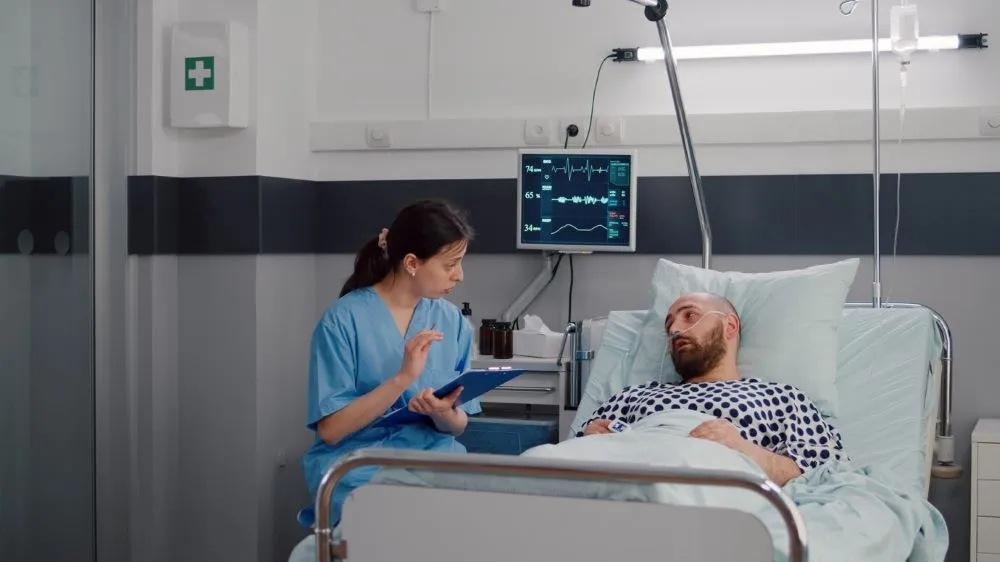Are you unsure of how to perfect emergency room billing services for maximum reimbursements? This blog will help you figure out the way. We have covered all the ins and outs of emergency room billing. The blog has also shown how outsourcing your emergency room medical billing services is the right way for you. Continue reading further and learn how to increase revenue with impeccable ER billing.
Moreover, in the fast-paced world of healthcare, efficient billing processes are paramount. Explore our suite of emergency room billing services designed to alleviate the administrative burden on your staff, minimize claim denials, and accelerate revenue recovery.
Overview of Emergency Room Billing
Emergency room billing only applies to the emergency department of hospitals. An emergency room is a separate treatment facility away from other hospital departments. It is used for specialized patient cases in emergency medicine.
In emergency medicine, you provide acute care to your patients without a prior appointment. They may go to hospitals either by themselves or by ambulances. An emergency room is one of the most important departments in primary care centers.
The patient flow of emergency departments has an unplanned nature. As a result, you may have to provide initial treatments for several illnesses and injuries. Some of those illnesses and injuries can be life-threatening. And you may have to provide immediate attention to them.

How Does Emergency Room Billing Help?

1. Critical Care Reimbursement
Emergency room billing has to make critical care reimbursements smooth for patients. Patients are already worried about their medical emergencies. You do not want to add to their unexpected concerns. Every complexity of emergency medical coding is considered. You can also work with unexpected and intense interventions in emergency situations.
2. Emergency Medical Treatment Regulatory Compliance
Emergency room billing also complies with the regulations of emergency medical treatment. An example of a major ER regulation is the Emergency Medical Treatment And Labor Act. Based on this regulation, hospitals must provide emergency care even if patients cannot pay. Proper billing practices enable you to fulfill such regulatory requirements. This way, you can also manage the finances of your emergency care.
3. Trauma Care Billing
Emergency room billing services are specially designed to manage complex cases. This includes trauma care. All the nuances of billing required for critical trauma interventions have already been developed. Emergency room billing considers several trauma services and specialists at a time. These services and specialists are often involved in such cases.
4. Emergency Department Finance Management
You can also conduct emergency room billing to manage the finances of your emergency department efficiently. It can successfully manage your revenue cycle. Your claim denials can be reduced, which will improve the billing process. These practices will make your emergency services financially sustainable for future cases.
5. Rapid Claim Submission
Everything happens quickly in emergency room billing. In some cases, patients do not have a lot of time. Staying on time is a critical step in emergency care billing. So, emergency room billing services can rapidly submit your claims. You can also aim for a swift turnaround in your revenue cycle. Being fast in emergency billing processes also maintains a consistent cash flow. You can also support your ongoing emergency care services.
Benefits Of Outsourcing Emergency Room Billing Service

Outsourcing companies bring knowledge and accuracy to medical billing for emergency rooms. They can also maintain a revenue cycle free of errors for your practice. Outsourcing also adds value to your billing processes.
They include demographics entry, insurance eligibility verification, account reconciliation, and much more. Health Quest Billing is dedicated to providing friction-free billing and submitting accurate claims. We also ensure a smooth payment posting process.
Our billing professionals can consistently follow up with your accounts receivables. We can even conduct prior authorization with insurers to avoid claim denials. Our medical billing company has a separate team for denial management.
Their sole purpose is to shift your concern from denial management to denial prevention. This is conducted with the help of a range of qualified specialists.
Most outsourcing companies have certified billing professionals from AAPC. Its full form is The American Association of Professional Coders. They are also familiar with common medical billing software such as Medic, Medisoft, and many more.
Their medical coders are also trained in top coding software. They include EncoderPro, Flashcode, and CodeLink. Such outsourcing companies can effectively conduct emergency room billing and coding processes.
They are able to apply standard procedures and supply codes. Your emergency room services can also be assigned ICD-CM diagnosis codes. All this will happen as per CMS guidelines.
Many outsourcing companies also have a successful track record of processing average emergency room bills. They have worked with leading primary care centers, which serves as enough proof. Your outsourcing partner can also negotiate with insurance companies.
This applies to insurer policies that are specific for emergency room billing. They can also identify individual emergency room cases. You can get your physicians educated on emergency room physician billing for unbilled procedures.
The quality of your clinical documentation about emergency room cases can also improve. These practices can improve your revenue at significant rates in no time. The percentage of your claim denials can also drastically decrease.
Apart from that, navigate the complexities of anesthesia billing effortlessly with our expert guide. From understanding anesthesia-specific codes to tackling common billing challenges, we equip you with the knowledge needed to maximize revenue and minimize denials.
What To Look For When Outsourcing Your Emergency Room Billing Services

1. Scale Of Practice Needs
Hospitals must first determine the scale of the needs for their emergency room practice. Outsourcing companies are specialized in their ability to deal with various scales. Some of them can easily manage the emergency room medical billing processes of enterprise-level practices.
Others can only offer their services to small care centers. They have limited resources and staff. As a result, they can only target limited insurance companies. Your selection depends on the size and budget of your practice.
Another essential aspect is the number of insurance companies you are affiliated with. This means you can only partner with a specific level of outsourcing companies. It can either be a small-scale medical billing company. Or an emergency room practice management company.
2. Strong And Positive Market Reputation
An outsourcing company should have a strong and positive reputation in the healthcare market. They should be providing exceptional revenue cycle services for a long time. Hospitals can go online and research the client reviews of top outsourcing companies. This way, you can evaluate the reputation of any outsourcing company. You must also ask their clients.
Those discussions can include experiences of interrupted services that caused revenue loss. You can also ask those outsourcing companies for their testimonials and references. This way, you can verify their emergency room billing quality.
3. Denial Management Support
While selecting your outsourcing partner, you must look for a modernized denial management system. You have to confirm this since many outsourcing companies do not have a claims appeal process.
Some medical billing companies even offer dedicated denial management services. Such services will bind you to pay extra charges. Your outsourcing company should have a clear justification about how they will handle claim denials.
They should also have a process in place for resubmission. This way, you can ensure that you will receive full reimbursements for your practices.
4. Past Experience
It is better for outsourcing companies to have past experience in emergency room billing. It can prevent revenue leakage. It should also have enough knowledge about providing billing services. You must ensure this as invalid claims submission causes claim denials.
You should only work with companies that specialize in your type of revenue cycle management. This way, you can ensure that your outsourcing partner has billing and coding professionals. Their services completely follow the relevant payer regulations.
Hospitals are also advised to ask medical billing companies questions. These questions can give an idea about the quality of their revenue cycle services. It will enable you to determine which companies have been working for a long time.
5. Cost Analysis
Most outsourcing companies charge around 3% to 9% of your revenue collections. Others tend to charge flat fees for their service charges. You can apply a cost analysis process for different emergency room billing companies.
You should first decide your billing preference. How would you like to be charged? You can either pay a percentage of your revenue or a flat fee. You can even list down such companies based on your preference.
With lists, you can compare their rates. How much are they charging? It is better not to compromise on the quality of the service because of a slight price difference. A company charging less than others does not mean it provides premium quality services.
How to Prevent Emergency Room Billing Claim Denials?
1. Adhering EMTALA Regulations
The full form of EMTALA is the Emergency Medical Treatment and Labor Act. According to this act, the medical sector has set regulations for emergency room billing. You must verify that your emergency screenings and stabilizing treatments follow them. You can also document them to prevent claims denials caused by non-compliance.
2. Medically Necessary Documentation
Hospitals should provide detailed documentation to insurance companies. These documents must justify the medical necessity of your emergency room services. They should be clear and thorough. The insurers should understand the urgency and critical nature of your services from those documents. This way, you can reduce the likelihood of denials from those insurers.
3. Regular Staff Training and Education
Emergency room billing services are more complex. They are usually unscheduled and need urgent care. Keeping that in mind, you should provide regular training sessions to your staff. The staff includes physicians, nurses, and the administrative staff as well.
They must also be educated on the importance of fast and accurate documentation. Their coding and compliance must also be spot on. Regular training and education will prepare your staff for every worst-case scenario.
4. Claim Tracking
You may have to do more than just claims submissions. Reimbursement claims must also be monitored and documented before submission. This way, you can submit them and file appeals in a timely manner.
You can also identify common trends in denials. It enables you to maintain a detailed oversight of your claims. You should track your denied claims as well based on their type and payer. This can be done during posting payments or other intervals.
What Are The New Emergency Room Billing CPT Codes?
According to the American Academy of Professional Coders, there are two main categories of CPT codes for emergency room billing services. They are named “New or Established Patient” and “Other Emergency Services.” The codes under the “New or Established Patient” category range from 99281 to 99285. There is only one code under the “Other Emergency Services” category: 99288.
1. 99281
This CPT code is assigned whenever a healthcare provider treats an emergency room patient. The patient has to be on the lowest level emergency department visit.
2. 99282
You must assign this code to those emergency department visits that involve evaluation and management (E/M). These visits require a straightforward level of medical decision-making from doctors.
3. 99283
Doctors can also assign 99283 to those emergency room visits in which they evaluate and manage patients. The difference lies in their level of decision-making. They involve a low level of making medical decisions.
4. 99284
The 99284 CPT code means the evaluation and management of emergency room patients. Doctors have to make moderate-level medical decisions for those patients.
5. 99285
This code is one step ahead of 99284. You do have to evaluate and manage patients with an emergency department visit. However, you are involved in a high level of decision-making for your medical cases.
6. 99288
This code is assigned whenever healthcare providers are away from their patients. They have to treat those patients via a two-way radio. This radio communication is usually facilitated by the emergency medical services personnel in the field.
They have to urgently connect doctors and patients as such cases require emergency care. These cases involve trauma patients who need advanced life support. You have to provide them with urgent care during transport to or from the emergency department.
The Bottom Line
Emergency room billing involves unique challenges like critical care reimbursement and trauma billing. It manages emergency department finances, improves revenue cycles, and ensures quick claim submissions.
Outsourcing brings expertise and denial management to hospitals. To prevent claim denials, you must follow EMTALA regulations, conduct staff training, and implement effective claim tracking. New emergency room billing CPT codes range from 99281 to 99288.
Contact us today if you also want to onboard top-quality emergency room billing services.







 11 mint read
11 mint read